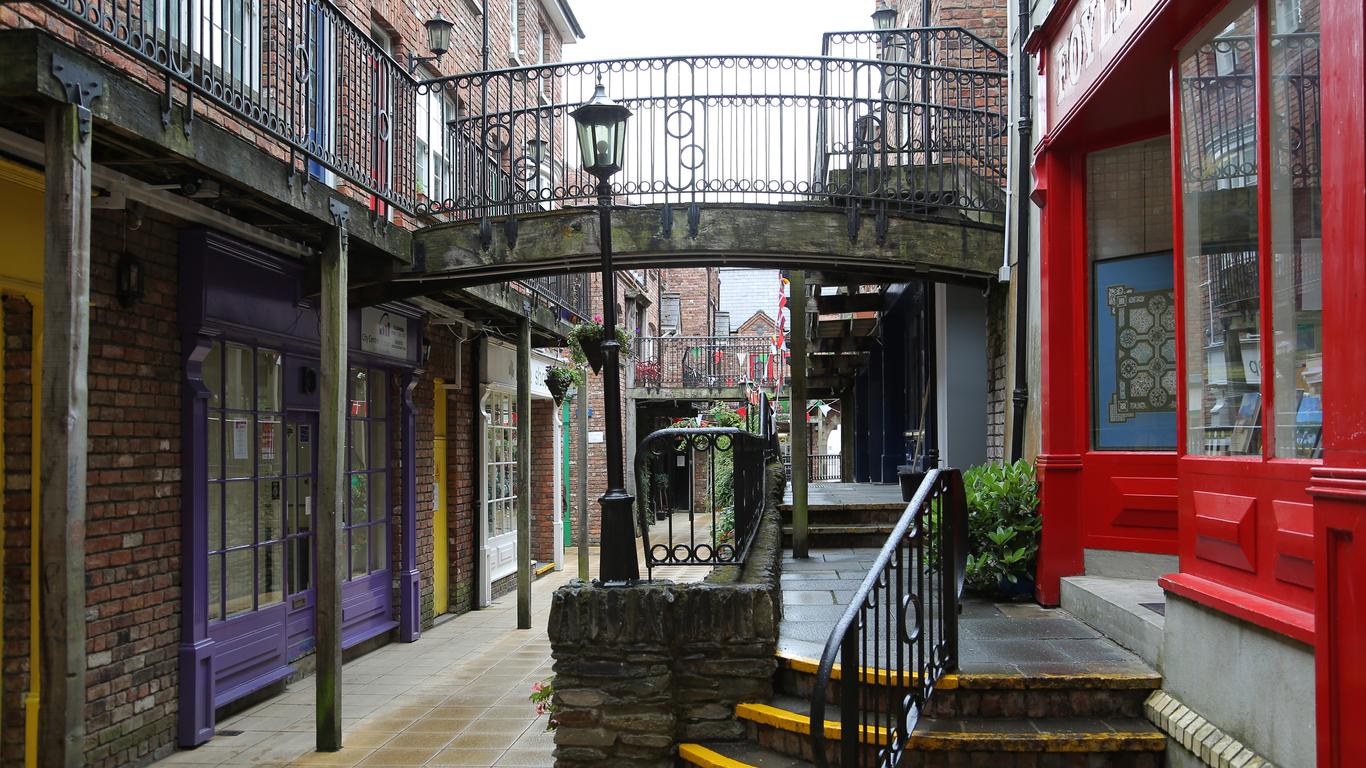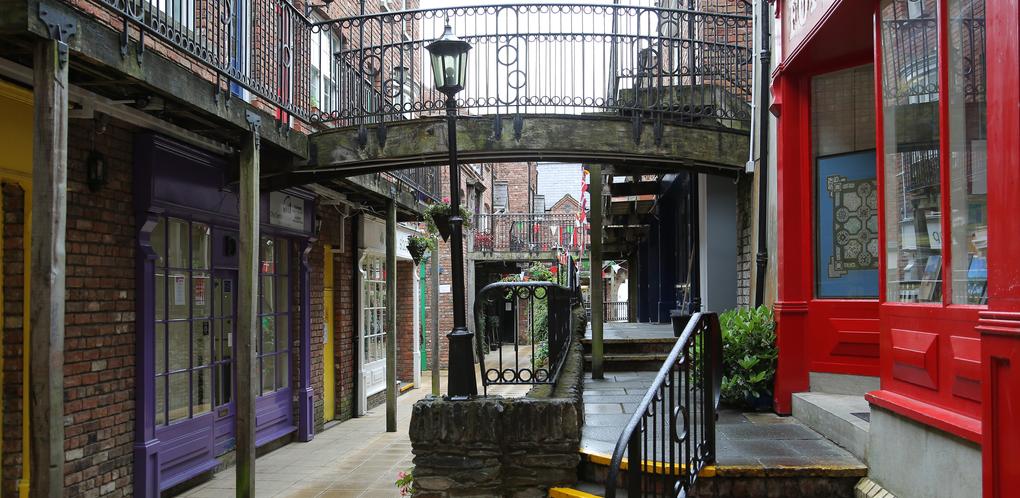
Londonderry travel guide
Londonderry Tourism | Londonderry Guide
You're Going to Love Londonderry
Londonderry or "Derry", as it's commonly known, has a history that's rich, a present that's easygoing and familiar, and an overall "heart of the Irish" vibe that Northern Ireland is so well known for. Its political history is close to the surface and memorialized through its public spaces, art, and even architecture. But its people, cuisine, and natural beauty will take you back to a simpler time.

Top 5 Reasons to Visit Londonderry
1. Take in the Political History
The Northern Ireland conflict is detailed in the city's political murals, museums, artist works, city walls, and various other monuments.
2. Take a Walk on the Two Bridges
The beautiful Craigavon Bridge and the more recently constructed Foyle Bridge allow travelers to keep connected to both sides of the city.
3. Visit Guildhall Square
Guildhall Square is a piece of historical architecture, true to the Irish culture and aesthetic. Today, the Hall is the main site of a local market that Derry citizens set up.
4. Enjoy the Local Cuisine
Enjoy fresh seafood, traditional pub fare, amazing grilled meats, and even a take on Mexican and Thai food.
5. A Hop and a Step from Beautiful Views
Take a day trip from Derry to Grianan of Aileach, a stone fort that affords visitors stunning views of Derry, Lough Foyle, and Lough Swilly.
What to do in Londonderry
1. Navigating History
The city's most prominent feature are the Derry Walls. These city fortifications measure only 1.5km in circumference, making it easy to stay within the historical center of Derry. The Derry Walls were built in the beginning of the 17th century and make this the only completely intact walled city in all of Ireland. The four original gates leading into the city-- Bishop's Gate, Ferryquay Gate, Butcher Gate and Shipquay Gate--are joined by three other modern gates to create 7 different entrances into the old city. The Derry Walls were constructed as a promenade structure from which to view the Renaissance style street plan.
2. Engage In Some Holistic Learning
This award winning attraction tells the history of Derry through interactive exhibits and is located near the famous Guildhall, St Columb's Cathedral, and St Augustine's Chapel. The entire complex features a discovery zone, learning space, cinema, and a genealogical history center as well as an exhibit of a local shipwreck from the Spanish Armada. In addition, the Tower Museum has worked carefully to document the political conflict in Derry between Northern Ireland and the Republic.
3. Learn The Story Of 'The Troubles'
Northern Ireland has a long and complicated past when it comes to relations with its Irish-Catholic neighbors to the south. During the late 20th century Derry was the center for many of these cultural clashes, including the Free Derry movement and the Bloody Sunday massacre. Remnants of this conflict can be found on the western side of the city walls, where you can view many political murals made by local artists and activists in the 90's. There are several guided tours of the Bogside area, which are recommended in order to gain a larger understanding of the history and nuances of the ethno-nationalist conflict known locally as 'The Troubles'.
4. Grab Some Treats
In the very center of the city lies a daily market popular among locals and tourists alike. Here you can pick up fresh local produce, artisan made crafts, or homemade prepared meals to enjoy while you take in the breathtaking surrounding architecture. Saturday is a particularly busy day for the open air market, as many travel from the Republic of Ireland to take advantage of the euro/pound exchange rate. Make sure to try the local meat pie, which is famous throughout Northern Ireland!
5. Root For The Home Team
A trip to the UK wouldn't feel complete without joining the crowds of loyal supporters and taking in a rowdy football match! The Derry City football club plays its league games at Brandywell Stadium on Friday nights and is one of the top teams in the entire Irish island. Tickets can be bought online or at the stadium itself, which is located just southwest of Derry city center. Travel tip: to blend in with the local fans, make sure to don the teams colors of red, black, and white!
1. Navigating History
The city's most prominent feature are the Derry Walls. These city fortifications measure only 1.5km in circumference, making it easy to stay within the historical center of Derry. The Derry Walls were built in the beginning of the 17th century and make this the only completely intact walled city in all of Ireland. The four original gates leading into the city-- Bishop's Gate, Ferryquay Gate, Butcher Gate and Shipquay Gate--are joined by three other modern gates to create 7 different entrances into the old city. The Derry Walls were constructed as a promenade structure from which to view the Renaissance style street plan.
2. Engage In Some Holistic Learning
This award winning attraction tells the history of Derry through interactive exhibits and is located near the famous Guildhall, St Columb's Cathedral, and St Augustine's Chapel. The entire complex features a discovery zone, learning space, cinema, and a genealogical history center as well as an exhibit of a local shipwreck from the Spanish Armada. In addition, the Tower Museum has worked carefully to document the political conflict in Derry between Northern Ireland and the Republic.
3. Learn The Story Of 'The Troubles'
Northern Ireland has a long and complicated past when it comes to relations with its Irish-Catholic neighbors to the south. During the late 20th century Derry was the center for many of these cultural clashes, including the Free Derry movement and the Bloody Sunday massacre. Remnants of this conflict can be found on the western side of the city walls, where you can view many political murals made by local artists and activists in the 90's. There are several guided tours of the Bogside area, which are recommended in order to gain a larger understanding of the history and nuances of the ethno-nationalist conflict known locally as 'The Troubles'.
4. Grab Some Treats
In the very center of the city lies a daily market popular among locals and tourists alike. Here you can pick up fresh local produce, artisan made crafts, or homemade prepared meals to enjoy while you take in the breathtaking surrounding architecture. Saturday is a particularly busy day for the open air market, as many travel from the Republic of Ireland to take advantage of the euro/pound exchange rate. Make sure to try the local meat pie, which is famous throughout Northern Ireland!
5. Root For The Home Team
A trip to the UK wouldn't feel complete without joining the crowds of loyal supporters and taking in a rowdy football match! The Derry City football club plays its league games at Brandywell Stadium on Friday nights and is one of the top teams in the entire Irish island. Tickets can be bought online or at the stadium itself, which is located just southwest of Derry city center. Travel tip: to blend in with the local fans, make sure to don the teams colors of red, black, and white!
Where to Eat in Londonderry
What about dinner in an old boathouse? Quaywest Restaurant serves up fresh food by the riverside: homemade fish cakes meets Indian chicken skewers and 6oz steak burgers. Two can dine comfortably for £30.
When to visit Londonderry
The best time to go to Derry is the summer months during June, July, and August. September can also be good. Temperatures during the summer average 73.
How to Get to Londonderry
Plane
The City of Derry Airport (LDY) is where domestic flights land. International flights land at Dublin Airport or Belfast International Airport. Taxi fare from the City of Derry Airport to the city center is £12.
Train
Translink's Northern Ireland Railways is the service commuters use for trains into Derry. A single adult fare depends on point of origin. From Belfast, for example, it's £20.60.
Car
Getting in from Dublin to Derry is a northern drive using the N2 and A5 highways. The journey takes about three hours.
Bus
There are a number of services provided by Translink that connect to cities like Dublin and Belfast. These include local bus services, express coaches, and rail services. Standard adult fare for an express coach, one way, is £18.
Airlines serving Londonderry
Where to stay in Londonderry
The Cityside - here is where most of the city converges for good eats, small shops, and the local markets at The Guildhall.
Popular Neighborhoods in Derry
Bogside - close to the city center and city walls, Bogside is home to many political murals and monuments that pay homage to the conflict in Northern Ireland.
The Waterside - on the east side of the banks of the River Foyle lies this tight-knit community, with mostly residential areas.
Where to stay in popular areas of Londonderry
Most booked hotels in Londonderry
How to Get Around Londonderry
Public Transportation
Derry is connected by buses from the main terminal on Foyle Street. Fares are £1.55 for a single ticket. A monthly pass costs £34.
Taxi
You can rent taxis in the city at a flat rate of £1.24. The per mile charge after that is £8.18. But the city is well connected enough that the average trip will cost you about £3.
Car
Companies like Ford of Londonderry and Enterprise are popular choices for rentals. Fares start at £45 per day for an economy four-seater.
The Cost of Living in Londonderry
Shopping Streets
Foyleside and Richmond Centre are your main haunts for shopping, as well as typically UK brands like Marks & Spencer and Dunnes Stores. Lovers of local markets converge at Guildhall Square.
Groceries and Other
A quart of milk costs around £0.88 and a dozen eggs costs approximately £2.
